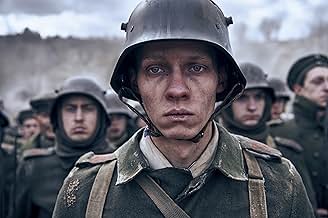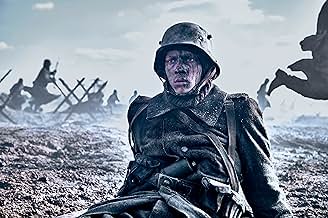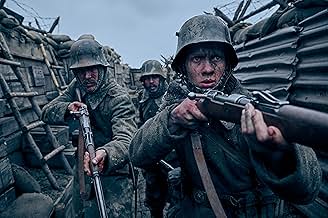Le terrificanti esperienze e l'angoscia di un giovane soldato tedesco sul fronte occidentale durante la prima guerra mondiale.Le terrificanti esperienze e l'angoscia di un giovane soldato tedesco sul fronte occidentale durante la prima guerra mondiale.Le terrificanti esperienze e l'angoscia di un giovane soldato tedesco sul fronte occidentale durante la prima guerra mondiale.
- Regia
- Sceneggiatura
- Star
- Vincitore di 4 Oscar
- 59 vittorie e 89 candidature totali
Recensioni in evidenza
Germany, May 1917. 17-year-old Paul Baumer enthusiastically enlists in the German army and heads off to war. His head is filled with patriotism, honour, visions of heroism and the confidence that Germany will win the war. He soon learns that his impressions of war are far from the reality.
Erich Maria Remarque's "All Quiet on the Western Front" was first published in 1929. It was quite revolutionary, depicting the horrific reality of war rather than the glamourous, sanitised version. In a sense it was the first anti-war novel. It was so unflinching in its portrayal of WW1 that the Nazi party regarded it as treasonous and had the book banned and stripped Remarque of his German citizenship, causing him to flee to Switzerland and ultimately the US.
In 1930 Hollywood made the book into a movie. It was superb, capturing well the horrors that Remarque depicted in his book. It deservedly won the Oscar for Best Picture (and Best Director) in 1930.
In 1979 it was adapted again, this time as a made-for-TV movie. Despite being directed by Delbert Mann and boasting a star-studded cast (Richard Thomas, Ernest Borgnine, Ian Holm, Donald Pleasance) this version was far from being in the same league as the 1930 version and didn't do the book justice. It is quite tame and the performances are quite subdued.
This, the 2022 version, once again captures the essence of the book and is quite unflinching in its portrayal of war. Graphic scenes and realistic plot show the wastefulness and horror of war.
Not as good as the 1930 version though: the characters aren't as fully developed, limiting engagement, and the plot feels a bit padded. A few drawn out scenes could easily have been shorter without losing any detail. Some style-over-substance elements too as the director went overboard with the special effects he had at his disposal (the French counter-attack with tanks and flamethrowers is a good example). The droning sound didn't help either (clearly the director has watched Christopher Nolan's "Dunkirk").
Erich Maria Remarque's "All Quiet on the Western Front" was first published in 1929. It was quite revolutionary, depicting the horrific reality of war rather than the glamourous, sanitised version. In a sense it was the first anti-war novel. It was so unflinching in its portrayal of WW1 that the Nazi party regarded it as treasonous and had the book banned and stripped Remarque of his German citizenship, causing him to flee to Switzerland and ultimately the US.
In 1930 Hollywood made the book into a movie. It was superb, capturing well the horrors that Remarque depicted in his book. It deservedly won the Oscar for Best Picture (and Best Director) in 1930.
In 1979 it was adapted again, this time as a made-for-TV movie. Despite being directed by Delbert Mann and boasting a star-studded cast (Richard Thomas, Ernest Borgnine, Ian Holm, Donald Pleasance) this version was far from being in the same league as the 1930 version and didn't do the book justice. It is quite tame and the performances are quite subdued.
This, the 2022 version, once again captures the essence of the book and is quite unflinching in its portrayal of war. Graphic scenes and realistic plot show the wastefulness and horror of war.
Not as good as the 1930 version though: the characters aren't as fully developed, limiting engagement, and the plot feels a bit padded. A few drawn out scenes could easily have been shorter without losing any detail. Some style-over-substance elements too as the director went overboard with the special effects he had at his disposal (the French counter-attack with tanks and flamethrowers is a good example). The droning sound didn't help either (clearly the director has watched Christopher Nolan's "Dunkirk").
This movie did something I didn't expect from a World War movie...it makes you feel empathetic for the Germans. To an extent.
I'm no war buff so I'll leave the realism to the experts but what this movie does is show you the first World War from the view point of people who've never experienced or even conceived of war and bloodshed on this scale. It starts off with new recruits full of patriotism for their country expecting to be sent on a grand adventure only to have those expectations quickly shattered. Turns out war isn't fun, and not even initially due to the actual fighting. Just training and constantly being screamed at and controlled while marching your days away is brutal. Remember, while vehicles existed, they weren't common use at this period of time...these soldiers had to walk, walk, and walk some more to get to where the war effort was taking place. And even if they had vehicles most of those places didn't have roads yet to drive them on. Then there's the constant lack of food and water, rough sleeping conditions, being exposed to the elements. Just GETTING to the war is brutal. That's a good 3rd of the movie right there.
Then close to the half way point, after a few minor skirmishes, we see the war front and the trenches and get to see what that's like. Well...it's terrible! You pop up out of a trench and boom...you're shot. And that's just life in between charges. There was no strategy to the charges either, they relied on waves of bodies to gain even 100 meters, hoping to out pace the bullets constantly coming your way. Millions of young men died in this fashion, their bodies littering the field.
The most brutal part of the film is the weapons of war never before seen. Tanks, flame throwers, planes dropping bombs. Men screaming in pure terror while the bullet proof tanks drive over them, while flames fill their trenches, or planes blow them up while they flee.
And the odd thing is since we're seeing it from the eyes of the young German soldiers, who are truly clueless as to why they're really even fighting, you do empathize and feel sorry for them. You find yourself even rooting for them. This movie humanizes them but importantly shows the politicians who are truly to blame for the atrocities. The powerful men behind the scenes, bloated from being overfed on rich foods, hundreds of miles away from the pain and suffering they cause.
I have no idea how accurate this movie is but it's a pretty straight forward piece showing just how awful, terrifying, and destructive this period of time was. I really enjoyed it and recommend it to any fans of this genre.
I'm no war buff so I'll leave the realism to the experts but what this movie does is show you the first World War from the view point of people who've never experienced or even conceived of war and bloodshed on this scale. It starts off with new recruits full of patriotism for their country expecting to be sent on a grand adventure only to have those expectations quickly shattered. Turns out war isn't fun, and not even initially due to the actual fighting. Just training and constantly being screamed at and controlled while marching your days away is brutal. Remember, while vehicles existed, they weren't common use at this period of time...these soldiers had to walk, walk, and walk some more to get to where the war effort was taking place. And even if they had vehicles most of those places didn't have roads yet to drive them on. Then there's the constant lack of food and water, rough sleeping conditions, being exposed to the elements. Just GETTING to the war is brutal. That's a good 3rd of the movie right there.
Then close to the half way point, after a few minor skirmishes, we see the war front and the trenches and get to see what that's like. Well...it's terrible! You pop up out of a trench and boom...you're shot. And that's just life in between charges. There was no strategy to the charges either, they relied on waves of bodies to gain even 100 meters, hoping to out pace the bullets constantly coming your way. Millions of young men died in this fashion, their bodies littering the field.
The most brutal part of the film is the weapons of war never before seen. Tanks, flame throwers, planes dropping bombs. Men screaming in pure terror while the bullet proof tanks drive over them, while flames fill their trenches, or planes blow them up while they flee.
And the odd thing is since we're seeing it from the eyes of the young German soldiers, who are truly clueless as to why they're really even fighting, you do empathize and feel sorry for them. You find yourself even rooting for them. This movie humanizes them but importantly shows the politicians who are truly to blame for the atrocities. The powerful men behind the scenes, bloated from being overfed on rich foods, hundreds of miles away from the pain and suffering they cause.
I have no idea how accurate this movie is but it's a pretty straight forward piece showing just how awful, terrifying, and destructive this period of time was. I really enjoyed it and recommend it to any fans of this genre.
I'm truly conflicted: "All Quiet on The Western Front" is a surprisingly stark & cold film upon first watch, capturing the futility of war, loss of youth & corruption of innocence with an unsettling lack of emotion throughout.
It's something I couldn't help but notice as I tuned in; usually in historical war films (like Sam Mendes' "1917" for instance, following events through the eyes of the opposing British side), we're accustomed to typically witnessing soldier's actions depicted as valiant & honourable, with a palpable sense of pride & patriotism embedded throughout - in pieces which are made to catalogue their innumerable brave achievements conducted by every-day folk (who, through no fault of their own, found themselves in the trenches), in spite of insurmountable odds comprehensively stacked against them... But here, there's no dignity in anything that transpires; obstacles aren't admirably overcome, the ensemble don't conduct themselves in a way which is befitting of their station, worthy of respect & none of the characters win any semblance of what could honestly be described as "glory"... They're just young, impressionable fools - drunk on propaganda - who have mindlessly partaken in the unwarranted military occupation of foreign land, where they are obviously not welcome by the inhabitants. Due to this, there's a void of relatability & moreover, all the team of participants can dream of - once they arrive at the front - or endeavour to guarantee for themselves is survival, not greatness.
However, despite this inability to sympathise being an irksome grievance of mine, in the production's defense, I suppose that's actually intentional & rather the whole point (?), since it's meant to tell the story through the perspective of the vanquished, not the conquerors, reflecting how naive recruits (who'd been fatally misled, in conscripting themselves & their families in the first place) were gradually numbed to their feelings by the constant mental & physical anguish inflicted upon them in a continuous onslaught of pointless offensives (instigated by their generals), once reality had firmly bitten & they'd been collectively disabused of this fantasy - but unfortunately, that noticeable detachment from any of the characters featured results in a somewhat muted response (as a viewer) when they're incessantly chewed up & spat out by the gratuitous violence - that's shot in a hauntingly raw, ominous way - they're repeatedly (& needlessly) thrust in to by the callous, cowardly officers, who arrogantly orchestrate the entire miserable situation that needn't last a single day longer.
Again, I suppose that only reaffirms the statement the creators are trying to make, wilfully juxtaposing intense sequences of suffering & pain with little sentimentality & ambivalence; the film chronicles how Germany treated (or more accurately, mistreated) its own people, offering up generations of its future citizens on the battlefield as sacrificial lambs, massacred at the altar of a poisonous, nationalistic ideology which had taken root within the governing population; boys - barely men, even some who weren't yet - were essentially reduced to nothing but disposable, unimportant objects, thoughtlessly discarded & simply replaced in a sadistic game & quest for absolute power (no matter the personal cost or price paid in blood) - an incalculable loss which (even by the time the armistice came in to effect) still wasn't enough to satiate the tyrannical desires of the few, controlling the many... And the movie does therefore (to its credit) accurately reflect that exact point in its portrayal of the poor cannon fodder by representing them as exactly that, & additionally lenses the apathy of the superiors (who give the indefensible orders) through a perspective of rightful, scornful contempt.
Hence, I can understand the creative intentions (depicting the utter, irredeemable meaninglessness; the wanton, senseless destruction) & the grim inhumanity of it all... Yet after seeing such horrors & heinous cruelties, I guess I felt like I wanted a purpose to everything I'd sat through by the time the credits started rolling - & thought I'd been cheated by the fact that there wasn't one. On the other hand, like I acknowledge earlier, I assume that's not accidental - & rather the understandably cynical, bitter & despondent conclusion the narrative decidedly wants the audience to come to by the time it reaches its unsatisfactory denouement; there is no discernible reason that could ever hope to justify the carnage we observe - the savagery that unfolds is simply slaughter for the sheer sake of it & the trauma experienced by all those affected was utterly preventable, had the invaders put aside their vanity & pride & sought to preserve peace which could've so effortlessly been maintained.
Plus, it does also show one massive miscalculation on the side of the victors; forcing the Germans in to reluctant submission & backing them in to signing an agreement with terms they couldn't accept would ultimately entrench resentful animosity that would act as a spark to light the fire of the 2nd World War, only a few decades later etc. Foreshadowing what was to come before anyone could predict the oncoming calamity. Due to this, irrespective of what I think (or more aptly, how little it evoked within me), I must concede that it remains a success, regardless - because the project undoubtedly achieved its goal in a commendably brutal & unflinching manner - & I can't plausibly surmise any alternative which would've resulted in something better.
It's something I couldn't help but notice as I tuned in; usually in historical war films (like Sam Mendes' "1917" for instance, following events through the eyes of the opposing British side), we're accustomed to typically witnessing soldier's actions depicted as valiant & honourable, with a palpable sense of pride & patriotism embedded throughout - in pieces which are made to catalogue their innumerable brave achievements conducted by every-day folk (who, through no fault of their own, found themselves in the trenches), in spite of insurmountable odds comprehensively stacked against them... But here, there's no dignity in anything that transpires; obstacles aren't admirably overcome, the ensemble don't conduct themselves in a way which is befitting of their station, worthy of respect & none of the characters win any semblance of what could honestly be described as "glory"... They're just young, impressionable fools - drunk on propaganda - who have mindlessly partaken in the unwarranted military occupation of foreign land, where they are obviously not welcome by the inhabitants. Due to this, there's a void of relatability & moreover, all the team of participants can dream of - once they arrive at the front - or endeavour to guarantee for themselves is survival, not greatness.
However, despite this inability to sympathise being an irksome grievance of mine, in the production's defense, I suppose that's actually intentional & rather the whole point (?), since it's meant to tell the story through the perspective of the vanquished, not the conquerors, reflecting how naive recruits (who'd been fatally misled, in conscripting themselves & their families in the first place) were gradually numbed to their feelings by the constant mental & physical anguish inflicted upon them in a continuous onslaught of pointless offensives (instigated by their generals), once reality had firmly bitten & they'd been collectively disabused of this fantasy - but unfortunately, that noticeable detachment from any of the characters featured results in a somewhat muted response (as a viewer) when they're incessantly chewed up & spat out by the gratuitous violence - that's shot in a hauntingly raw, ominous way - they're repeatedly (& needlessly) thrust in to by the callous, cowardly officers, who arrogantly orchestrate the entire miserable situation that needn't last a single day longer.
Again, I suppose that only reaffirms the statement the creators are trying to make, wilfully juxtaposing intense sequences of suffering & pain with little sentimentality & ambivalence; the film chronicles how Germany treated (or more accurately, mistreated) its own people, offering up generations of its future citizens on the battlefield as sacrificial lambs, massacred at the altar of a poisonous, nationalistic ideology which had taken root within the governing population; boys - barely men, even some who weren't yet - were essentially reduced to nothing but disposable, unimportant objects, thoughtlessly discarded & simply replaced in a sadistic game & quest for absolute power (no matter the personal cost or price paid in blood) - an incalculable loss which (even by the time the armistice came in to effect) still wasn't enough to satiate the tyrannical desires of the few, controlling the many... And the movie does therefore (to its credit) accurately reflect that exact point in its portrayal of the poor cannon fodder by representing them as exactly that, & additionally lenses the apathy of the superiors (who give the indefensible orders) through a perspective of rightful, scornful contempt.
Hence, I can understand the creative intentions (depicting the utter, irredeemable meaninglessness; the wanton, senseless destruction) & the grim inhumanity of it all... Yet after seeing such horrors & heinous cruelties, I guess I felt like I wanted a purpose to everything I'd sat through by the time the credits started rolling - & thought I'd been cheated by the fact that there wasn't one. On the other hand, like I acknowledge earlier, I assume that's not accidental - & rather the understandably cynical, bitter & despondent conclusion the narrative decidedly wants the audience to come to by the time it reaches its unsatisfactory denouement; there is no discernible reason that could ever hope to justify the carnage we observe - the savagery that unfolds is simply slaughter for the sheer sake of it & the trauma experienced by all those affected was utterly preventable, had the invaders put aside their vanity & pride & sought to preserve peace which could've so effortlessly been maintained.
Plus, it does also show one massive miscalculation on the side of the victors; forcing the Germans in to reluctant submission & backing them in to signing an agreement with terms they couldn't accept would ultimately entrench resentful animosity that would act as a spark to light the fire of the 2nd World War, only a few decades later etc. Foreshadowing what was to come before anyone could predict the oncoming calamity. Due to this, irrespective of what I think (or more aptly, how little it evoked within me), I must concede that it remains a success, regardless - because the project undoubtedly achieved its goal in a commendably brutal & unflinching manner - & I can't plausibly surmise any alternative which would've resulted in something better.
A fascinating film with potential that was never fully achieved. "All Quiet on the Western Front" does not rely solely on shock value to disturb its audience; instead, it uses the horrors of war to sober them with facts and dismal realities. The film's story was worth telling; it left an impression long after the credits rolled. It dealt with many weighty themes, including a young man's journey through war, the difficulties of combat, the cruelty of desperation, and the value of friendship and camaraderie, all of which were handled with grace and artistry. Furthermore, it boasted first-rate production values, breathtaking visuals, a terrific score (although maybe a tad bit over the top), and stellar acting. Although there is much to praise about the film, "All Quiet on the Western Front" is ultimately hampered by its drawn-out length, the plot dragging in spots, and several confusing moments. All the pieces were in place for "All Quiet on the Western Front" to be the best picture of the year, and in some respects, it is. Fans of the genre, or anyone who appreciates a well-made film, should not miss this film despite its limitations.
Rating: 7.5/10 (Impressive)
Rating: 7.5/10 (Impressive)
I'm really a Film Nerd and I've watched many famous and less famous war movies, too. Until this Evening, the beach-sequene and the final of Saving Private Ryan was one of the most intense experiences I've seen on the big screen.
But what Berger and his teams show here is still incredible & and the most horryfying depiction of war I've ever seen before.
The violence makes you feel sick, there were really some moments I thought I have to leave the cinema. Shooting, Explosions, blood, cold, wetness, Tanks, flamethrowers and inhuman suffering. Meaningless suffering.
Yes, theire are some flaws in the Story, but Overall it works out fine. Music, acting and production design are phenomenal!
But the violience, I still can't believe it. Go watch - afterwards you'll definetley be pacifist.
8/10.
But what Berger and his teams show here is still incredible & and the most horryfying depiction of war I've ever seen before.
The violence makes you feel sick, there were really some moments I thought I have to leave the cinema. Shooting, Explosions, blood, cold, wetness, Tanks, flamethrowers and inhuman suffering. Meaningless suffering.
Yes, theire are some flaws in the Story, but Overall it works out fine. Music, acting and production design are phenomenal!
But the violience, I still can't believe it. Go watch - afterwards you'll definetley be pacifist.
8/10.
Lo sapevi?
- QuizErich Maria Remarque's book was inspired by his own experiences as a German soldier in World War I. Remarque fought in the trenches and the novel is notable for its realistic depiction of the horrors of battle, and the trouble soldiers face during and even after the fighting.
- BlooperBy the end, Germany's delegation to Rethondes appears indignant as the terms and conditions of armistice are quoted by Mathias Erzberger, namely forfeiting submarines, planes, weapons and so on; what is read there was not in the November 11, 1918 capitulation act but was imposed upon Germany next year in the Treaty of Versailles.
- Citazioni
Matthias Erzberger: All that's left separating us from an armistice is false pride.
- ConnessioniFeatured in Business Now: Episodio datato 19 ottobre 2022 (2022)
- Colonne sonoreEbben? Ne andrò lontana ('La Wally', Act 1)
Written by Alfredo Catalani and Luigi Illica
Performed by Maria Luigia Borsi
I più visti
Accedi per valutare e creare un elenco di titoli salvati per ottenere consigli personalizzati
Dettagli
- Data di uscita
- Paesi di origine
- Sito ufficiale
- Lingue
- Celebre anche come
- Sin novedad en el frente
- Luoghi delle riprese
- Aziende produttrici
- Vedi altri crediti dell’azienda su IMDbPro
- Tempo di esecuzione2 ore 28 minuti
- Colore
- Mix di suoni
- Proporzioni
- 2.39 : 1
Contribuisci a questa pagina
Suggerisci una modifica o aggiungi i contenuti mancanti


































